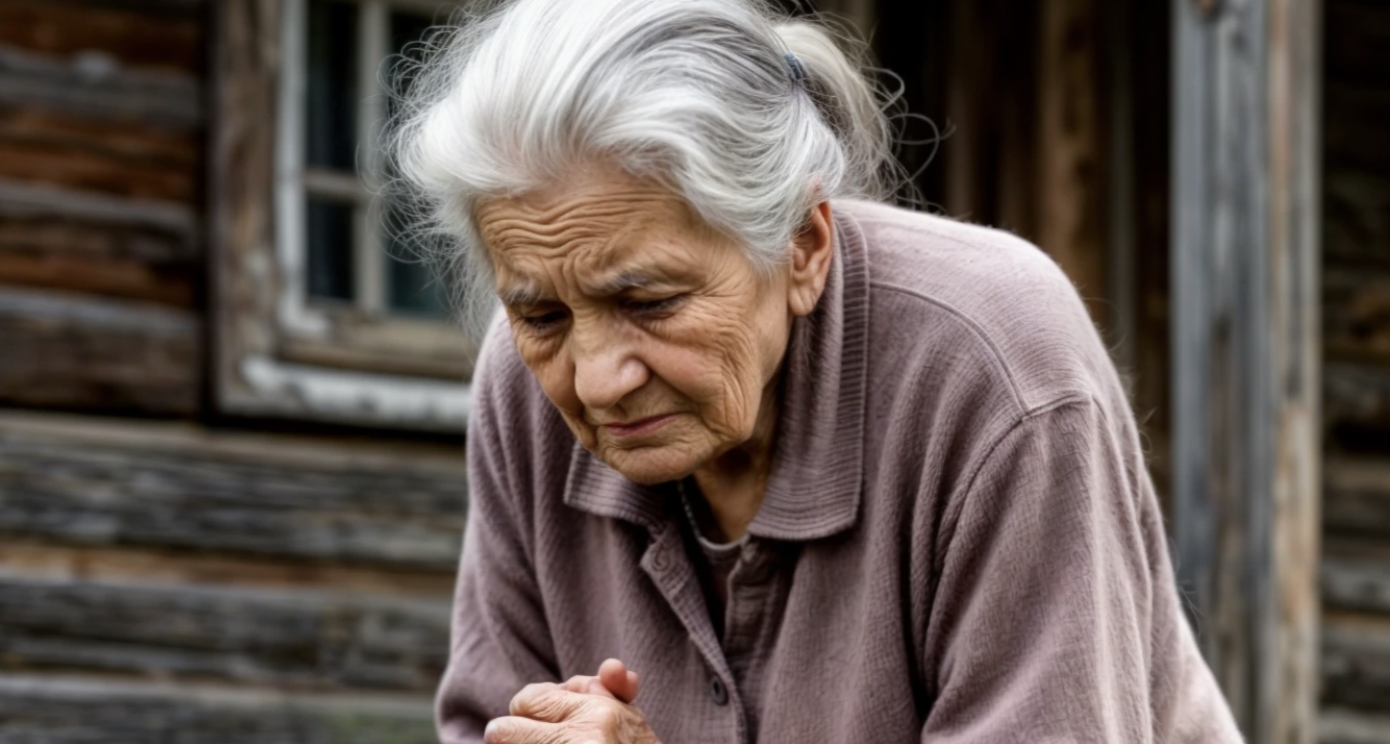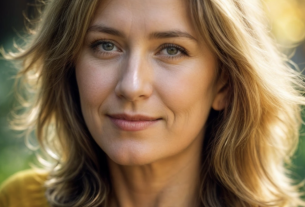The morning air in Zavrazhye was filled with the smell of frozen earth and smoke from chimneys. A green “Ural” truck rumbled down the main street, carrying bags of sand mixture — they were planning to build a modular club on the site of the old barracks. Fedya the excavator operator, sharply turning the wheel, smirked:
— Just a little more, and we’ll have to scoop up Evdokia’s house with the bucket.
Arkadiy, the postman on his bicycle, nodded in agreement:
— It’s about time, look, the walls are barely holding up. If it collapses, no one will want to take the responsibility.
The house stood at the very end of the street. Crooked, sunken into the ground, with a roof that looked like a crumpled hat. From a distance, it seemed abandoned long ago: crooked shutters, a fallen fence, a yard overgrown with burdocks. But every morning, a thin stream of smoke rose from the chimney, and a striped cat darted near the entrance. This meant someone was still living there.
Evdokia Semyonovna — a thin old woman of about seventy-eight — rarely interacted with her neighbors. She went to the store once a week: bought a pack of pasta, a couple of candles, and food for the cat. Always in an old quilted jacket, a oatmeal-colored scarf, and felt boots. She didn’t say much — just coughed.
The village council had long listed her house as “emergency housing.” They offered her a room in the free space at the construction crew’s dormitory. Evdokia, after listening, replied briefly:
— I’ll die here.
They didn’t argue further; but when they started talking about the site for the club, the issue resurfaced: her house was right in the way of the future access road.
On Monday, the council chairwoman, Lidiya Ananyeva, knocked on the old woman’s door.
— Evdokia Semyonovna, we have a proposal, — she sang out, entering without waiting for an invitation.
Inside, it smelled of dried apples and wet wool. On the bench, a huge dog — shaggy like a bear, with the face of a Doberman — was dozing. Upon seeing the guests, it lifted its head but didn’t growl.
— My God, what is this monster? — Lidiya whispered in fear.
— Tisha, — the old woman said calmly, — it’s one of mine.
The dog lowered its head back onto its paws.
— So, — Lidiya began, — your house is already in a dangerous condition. It’s rotting. We would like to… uh… free up the land. They’ll provide a room for you, warm, with plumbing.
— I’m not going, — Evdokia replied firmly.
— But, I’m sorry, it’s dangerous to live in such ruins.
— Dangerous or not, it’s mine.
The chairwoman’s face turned pale:
— If you refuse, the land will be deemed for demolition, and…
The old woman took a bucket of water from under the stove, placed it on the table, and poured some for the dog.
— Tear down everything except the stove. My son built that stove.
The conversation hit a dead end. Lidiya blushed, slammed the door, and left.
The next day, a rumor began to spread through the village: “Soon the tractor will come to Dushkina’s house.” Some condemned it, others sympathized.
On Friday, the paramedic Sasha visited Evdokia to measure her blood pressure. While applying the cuff, she carefully asked:
— Why stay there? In the winter, there’s no firewood, and the roof leaks.
— I’m not alone, — muttered the old woman.
The paramedic thought she meant the dog and sighed.
— Still, think about your health.
She left.
On the following Tuesday, unusually warm for March, Lidiya Ananyeva got up early and instructed that the crane operator Fedya be there by nine: “First, we’ll try to reach an agreement, and if not, we’ll start dismantling.” They arrived.
A small crowd had already gathered by the gate: the shop assistant Zinaida was sighing, neighbor Arkadiy stood by, paramedic Sasha, and the labor teacher Sergey Palych. All of them watched as Evdokia loaded empty bottles into a cart.
— What are you doing? — Lidiya frowned.
— Selling, — the old woman rasped.
— Why do you need these bottles?
— For building materials.
Fedya burst out laughing:
— What are you going to build? There’s nothing but ruins around here.
But the laughter stopped when the dog appeared from the house — and not alone. Two smaller dogs followed it, then a cat, a cat with a kitten, and finally, a limping crane, which had been hit by a motorcyclist last summer. The bird limped but was full of life.
— My God… — Zinaida gasped.
Behind the crane, a little goat with a broken horn appeared, and next to it, a rabbit with bandaged ears hopped.
The crowd froze.
Evdokia took off her gloves and waved her hand:
— These are my tenants. Where else can I put them?
The chairwoman opened her mouth but found no words.
All the animals were different, but each showed clear signs of illness or injury. The dog Tisha sat in front of Evdokia, as though guarding her.
The labor teacher, who had been silent all this time, finally spoke:
— Did you pick all of them up?
— Who else? — the old woman adjusted her scarf. — People threw them away. The rabbit got caught in a trap, Tisha was hit on the road and abandoned. The crane was almost killed by dogs.
Lidiya coughed hoarsely:
— But you’re not a veterinarian. How do you feed them all?
— Whatever God sends, — Evdokia nodded toward the cart of bottles. — I sell, buy feed, grains. I heat the stove — there’s warmth. They have nowhere else to go.
Neighbor Arkadiy quietly took off his hat.
The paramedic Sasha turned to the chairwoman:
— We can’t demolish the house if there are animals living here. It would be cruel.
Fedya scratched his head:
— Lida, maybe we can find another way? There’s a backup road.
— Another option would be more expensive, — she hissed.
At that moment, two fifth-grade schoolboys ran around the corner. Upon seeing the zoo, they gasped.
— Wow! A whole farm! — exclaimed one. — The guys won’t believe this!
Evdokia tiredly sat down on a log.
— I’m not holding anyone here against their will. But if they are kicked out, they’ll die.
Sergey Palych, who had been silent until then, finally spoke:
— If we allocate another plot, closer to the field, and build a shed there…
— With what money? — Lidiya flared up.
The shop assistant Zinaida wiped her hands on her apron:
— The “Provision” store can write off expired goods — yesterday’s bread, vegetables with defects. That’s something.
The paramedic added:
— I can do the vaccinations and check them. I have syringes and medicine.
Arkadiy raised his bicycle:
— I won the lottery, I can buy boards.
Fedya slapped the bumper:
— After my shift, I’ll help dig the foundation.
The old woman raised her eyes and smiled for the first time:
— Why do you need this?
The labor teacher raised his hand, as though in class:
— Lida, what if we set this up as a kids’ club, “Living Corner”? The school could take it under its patronage, build a new shed. Evdokia could be the caretaker. The land is municipal, it’s free for education.
Lidiya bit her lip, thinking it over, calculating the benefits: the club project could be adjusted, and such stories always attract media attention.
— Well… I suppose it works, — she said. — But first, the vet service needs to check it.
The dog Tisha quietly barked, as if agreeing.
Within a week, the yard turned into a real construction site. The men built the frame, the kids ran around with boards. Lidiya worked on the paperwork, the paramedic treated the animals. The store under Zinaida’s leadership gathered baskets of expired products.
When the district head heard about it, he rushed over with a photographer:
— A wonderful initiative! This is a social project, sustainable development!
Everyone exchanged understanding glances: it was clearly an election campaign.
By May, a warm shed with two annexes appeared on the site of the weeds: one for the birds, the other for the goat. The crane was given a separate aviary. A sign was placed on the fence: “Dusya’s shelter ‘Warm Yard’.”
Evdokia Semyonovna was repeatedly urged to move into a new house nearby: it had a stove, a bed, and electricity. The old woman resisted but eventually agreed.
— The main thing is that they don’t mess with my son’s stove, — Fedya joked.
— They won’t, — she sighed, stroking the old pipe. — I’ll still be nearby.
In the fall, the school launched a club called “Kind Hands.” Once a week, the children came to feed the animals, learning to care for them: cleaning hooves, filling bowls. The rabbit grew, the bandage fell off its ears; the crane could now hop from perch to perch.
Evdokia sat by the door, knitting socks for sale. Tisha lay at her feet, as if guarding her peace.
One day, Arkadiy brought a fox on his bike: “We found it under the bridge.” Later, the paramedic brought a stork with a dislocated wing. The shelter grew, like the pages of a living fairy tale.
One day, Lidiya stopped in the middle of the yard, looked at the well-fed animals and neat cages:
— Well, the old house was demolished, but life remains.
Evdokia remained silent:
— The house was my memory, and this is my work. Memory stays in the heart, and work — on the land.
Lidiya extended her hand:
— You know what? This summer, I’ll organize a volunteer camp. So that help is permanent.
— Your right, — the old woman nodded. — But let it be not for a week, but forever.
Tisha barked briefly, wagging his tail in approval.
A year later, the district newspaper published an article: “The first private shelter ‘Warm Yard’ has opened in Zavrazhye.” In the photo, Evdokia Semyonovna holds a kitten, surrounded by schoolchildren, with a new memorial plaque in the background: “On the site of the old house, a home grew for those who cannot be abandoned.”
The old woman modestly asked:
— Let this plaque not be just mine, but for the whole village.
The journalist asked:
— What is the main lesson you learned from this story?
Evdokia adjusted her scarf:
— Not everything old should be torn down. Sometimes, under a rotten roof, there’s something that would make life worse for people without it.
And she smiled. In her eyes reflected the new roof, where sunlight danced, and under it, someone was quietly tapping their hooves: life continued full force.



